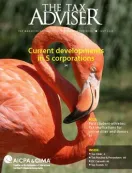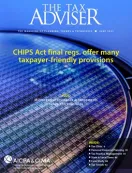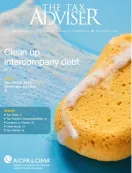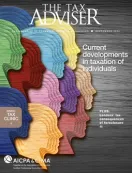Mimi Song, COO, Exactera, discusses how AI can improve transfer pricing compliance.
C Corporation Income Taxation
Guidance on research or experimental expenditures under H.R. 1 issued
The revenue procedure advises taxpayers how to make various elections, file amended returns, and change accounting methods as provided under Section 70302 of the new law.
AICPA presses IRS for guidance on domestic research costs in OBBBA
In its letter, the AICPA said small businesses that have not filed returns for the 2024 filing period face uncertainty about how to treat domestic research and experimental expenditures.
IRS includes several AICPA recommendations in corporate AMT interim guidance
In a notice issued Tuesday, the IRS said it intends to partially withdraw proposed regulations and issue revised proposed regulations.
Impact of ‘beginning of construction’ on Inflation Reduction Act credits
Taxpayers may be able to claim the PWA multiplier for certain credits if a project’s “beginning of construction date” is before Jan. 30, 2023.
A transfer pricing paradox: High-risk transactions remain underrepresented in APAs
Intangible property transactions are a minority of those covered by advance pricing agreements, despite their generally high risk for taxpayers.
Sec. 181: Will 2025 be the series finale?
Sec. 181 expensing of costs of qualified film, television, and theatrical productions gives producers cause to cheer, but the curtain may be falling on this temporary provision.
Clean fuel production credit: Regulatory roadblocks ahead
Early guidance for the new Sec. 45Z clean fuel production credit raises concerns regarding the eligibility of fuel sales to wholesalers.
Federal excise tax traps for the unwary
Editor: Mary Van Leuven, J.D., LL.M. The U.S. government imposes federal excise taxes that can affect a surprising variety of companies. These taxes include the foreign insurance excise tax, the Patient–Centered Outcomes Research Institute (PCORI) fee, and the relatively new stock repurchase excise tax. Compliance with these taxes can be
Global expansion of e-invoicing and digital reporting obligations for nonresidents
Countries are expanding e-invoicing and digital reporting obligations to nonresidents to increase value-added-tax compliance.
Strategic trade management in 2025: Navigating and mitigating tariffs
As tariffs continue to affect costs, U.S. importers can employ these strategies to minimize their duty exposure.
CHIPS Act final regs. offer many taxpayer-friendly provisions
Congress incentivized domestic manufacturing of semiconductors and semiconductor manufacturing equipment as part of the Creating Helpful Incentives to Produce Semiconductors (CHIPS) Act of 2022.
AICPA makes Priority Guidance Plan recommendations to IRS
In addition to its 183 recommendations for the IRS plan, the AICPA encouraged the agency to continue to pursue tax simplification.
Appeals court leaves tariffs in place, seeks expedited argument schedule
A federal appeals court extended its stay of a nationwide injunction on tariffs imposed by a trade court and proposed a schedule that would include oral arguments on July 31 in the challenge to the president’s authority.
The proposed PTEP rules: Tax basis considerations under Sec. 961
Proposed regulations for previously taxed earning and profits of foreign corporations address a range of considerations for shareholder basis adjustments.
Using transfer pricing to blunt the effects of tariffs
Understanding the interrelationship of transfer pricing and tariffs is key to mitigating the effect of those levies on earnings.
Disregarded-payment-loss rules: How multinationals should prepare
New final regulations pose significant implications for possible income inclusions by U.S. corporations with foreign disregarded entities.
Simplified method to determine corporate AMT applicable status issued
A notice issued by the IRS with interim guidance for the application of the corporate alternative minimum tax offers an optional simplified method for determining applicable corporation status under Sec. 59(k).
Navigating the complex interplay between Secs. 108(e)(6) and 367(c)(2)
A common method of resolving intercompany debt can entail ambiguity when a foreign subsidiary is involved, due to a dearth of regulatory guidance.
Tax planning for health care management services organizations
Management service organizations, common in the health care industry, can provide certain tax advantages.
employee benefits & pensions
Profits interests: The most tax-efficient equity grant to employees
By granting them a profits interest, entities taxed as partnerships can reward employees with equity. Mistakes, however, could cause challenges from taxing authorities.














